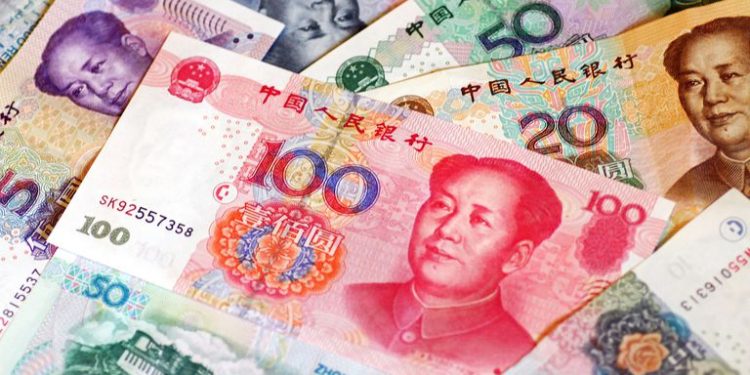Increased foreign investment into Chinese markets could boost the usage of the yuan, pushing it to become the third largest reserve currency in the world — behind only the U.S. dollar and the euro, Morgan Stanley analysts predicted in a report distributed Friday.
The forecast comes as the Chinese government has been trying for years to promote the international use of the yuan, also known as the renminbi (RMB).
Right now, the yuan accounts for about 2% of global foreign exchange reserve assets, the report pointed out. But it could rise to between 5% and 10% by 2030, surpassing the levels of the Japanese yen and British pound, the analysts said. The forecast reiterates one that the bank made in February 2019.
In the 18 months since, the Chinese government has stepped up its efforts to allow more foreign financial institutions into the domestic market. Overseas investors have also been increasingly turning to the Chinese market for the potential of relatively higher returns than that of other regions.
Investment portfolio inflows will become more important than foreign direct investment in the next decade, for a cumulative $3 trillion of inflows, Morgan Stanley predicted.
“We expect private and reserve managers will generate more than US$150 billion in total portfolio inflows to China in 2020, for the third consecutive year, highlighting the transformations underway. The annual inflow should reach US$200-300bn in 2021-30,” the report said.
With these investments, more global assets will be held in yuan, which has struggled to gain traction on an international level. The Chinese government has traditionally kept a tight grip on the currency, including preventing large amounts of capital from leaving the country.
However, in 2015 the International Monetary Fund made the politically significant move of adding the yuan to its basket of major reserve currencies — known as the special drawing rights basket. The yuan was added to the IMF’s basket in October 2016.
Morgan Stanley predicted the yuan will likely strengthen to 6.6 yuan versus the U.S. dollar by the end of 2021. The Chinese yuan traded near 6.85 yuan versus the dollar on Friday.
″(The 5% to 10% target) is not unrealistic in light of the financial market opening in China, the growing cross border capital market integration we see across equities and fixed income and an increasing proportion of China’s cross-border transactions being denominated in RMB,” Morgan Stanley international strategist James Lord said in the report. “All of this suggests global central banks will need to hold more RMB as part of their reserves.”
“As of end 2019, there are approximately 70 central banks around the world that hold RMB in their reserves, up from 60 at the end of 2018, according to the PBOC’s annual RMB internationalization reports,” Lord said, referring to the People’s Bank of China, the country’s central bank.
Also feeding into the analysts’ thesis is changes in China’s economic drivers — primarily reliance on exports for growth — will require the country to become an importer of capital. The report projects the country’s current account, which includes trade and payments to foreign investors, could turn negative from 2025 and reach negative 1.2% of GDP by 2030.
“This means at least US$180 billion of net foreign capital inflows per year in 2025-30 are needed to finance the current account deficit,” the report said.
Potential risks
How central banks and investment institutions might handle any political pressure around the allocation of their holdings remains to be seen. Tensions between the world’s two largest economies that started over trade have spilled into technology, as well as finance, in the run-up to U.S. President Donald Trump’s bid for re-election in November.
“I continue to be very skeptical about any dramatic rise in the RMB as a major reserve currency,” Michael Pettis, professor of finance at Peking University, said in an email.
“I don’t think there is any reason to disagree with Morgan Stanley’s current account projections, but I would observe that it is very hard to make long-term predictions about the evolution of China’s current account,” he said.
“The extent of the adjustment China must make in order to rebalance the sources of demand in its economy is substantial, and every one of the historical precedents suggests that the adjustment will involve a transformation of economic (and perhaps political) institutions,” he added.
However, Morgan Stanley noted there are several risks to their prediction that the yuan will grow in international prominence. These include slower-than-expected opening of the Chinese financial markets to foreign investment, global market volatility, China’s economic risks and significant escalation in U.S.- China tensions.
“Another area where we could be wrong is in the trend of the internationalization of CNY (Chinese yuan) and the willingness of reserve managers to add CNY bonds to their portfolios,” the report’s authors said.
“After all, the bulk of the increase in China’s share in reserve assets has so far come from Russia and it is not yet clear to what extent others will follow suit, particularly if the broader opening up of the economy does not take place in time.”







